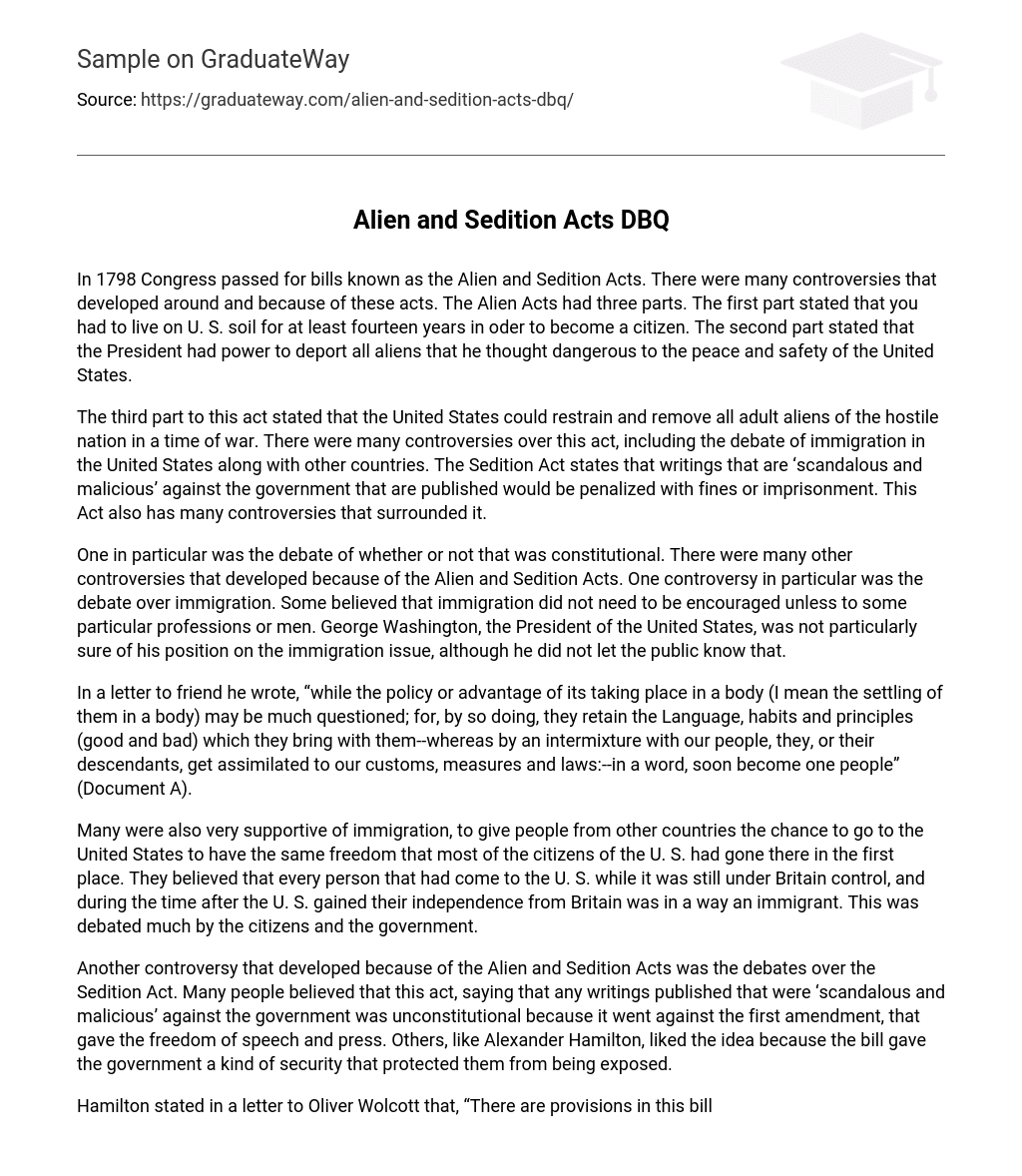In 1798, the Alien and Sedition Acts were passed by Congress, resulting in numerous controversies. These acts consisted of three elements: the first requiring individuals to reside in the United States for a minimum of fourteen years to attain citizenship; the second granting the President authority to expel any aliens deemed threatening to national peace and security.
The third part of this act stated that the United States had the power to limit and remove adult aliens from any enemy nation in times of war. This act sparked many controversies, which included debates about immigration not only in the United States but also in other countries. The Sedition Act also punishes individuals who publish scandalous and malicious writings against the government, causing additional controversies related to the act.
Two controversies arose due to the Alien and Sedition Acts: one concerning their constitutionality, and the other regarding immigration. Some argued in favor of limited immigration for specific professions or individuals. President George Washington remained undecided on this issue despite not publicly expressing his stance.
He wrote a letter to a friend expressing his opinion on the policy of settling immigrants as a group. He believes that this approach may have drawbacks because it allows them to maintain their own language, habits, and principles (both positive and negative). However, if they were to integrate with our population, either the immigrants or their descendants would slowly adopt our customs, practices, and laws. Ultimately, they would become integrated into our cohesive society. (Document A)
Support for immigration was also expressed by many, as it provided individuals from other nations with the chance to experience the same liberties that numerous U.S. citizens had initially pursued upon immigrating to America. Advocates contended that anyone who arrived in the U.S. during its period as a British colony or after attaining independence from Britain could be regarded as an immigrant in some capacity. This subject generated substantial discussion among both citizens and the government.
Another controversy arose as a result of the Alien and Sedition Acts surrounding the debates over the Sedition Act. Numerous individuals argued that this act, which deemed any published writings that were considered ‘scandalous and malicious’ against the government as unconstitutional, violated the first amendment granting freedom of speech and press. Conversely, individuals such as Alexander Hamilton supported the notion as it offered the government a form of protection against exposure.
Hamilton wrote in a letter to Oliver Wolcott that he believed certain provisions in the bill were exceptionally dangerous and could potentially lead to civil war (Document O). Congressman Albert Gallatin from Pennsylvania, who opposed the bill in Congress, argued that the only evidence presented by its supporters were writings expressing the belief that certain government actions were misguided or motivated by improper motives, and that some of these actions were unconstitutional.
This bill and its supporters view anyone who opposes the government’s actions and expresses distrust in current leaders, whether through speaking or writing, as seditious and an enemy to both the government and the Constitution (Document P). This dispute was just one of several that arose from the Sedition Act. Another major controversy stemming from the Alien and Sedition Acts was Anti-Federalism, which advocated for protecting individual rights and including them in the Constitution to ensure their protection.
In a letter to a friend in Italy, Thomas Jefferson, an Anti-federalist, voiced his concerns about the emergence of a party advocating for an Anglican monarchial and aristocratic government. This party aims to adopt the substance of the British government, which contradicts America’s noble love of liberty and republican ideals that led them to victory in the war. However, Jefferson pointed out that despite this, the majority of citizens and the entire landed interest still uphold their republican principles. Additionally, a significant portion of the talented population also supports these principles (Document G).
He states that most people are still republican, but the government is becoming federalist. Several controversies arose due to the Alien and Sedition Acts in 1798, and this paper discusses just a few of them. The purpose of these Acts was to increase government control over residents of the United States. Although many disagreed, the Acts were passed.





